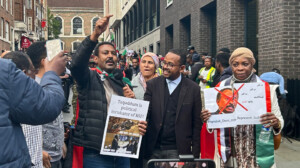Observatory: Internet blocked to suppress Sudan demonstrations
An international observatory reports targeted internet disruptions to Sudan’s internet infrastructure to suppress the widespread public demonstrations across the country. There is evidence of attempts to block people from social media platforms through internet providers.
 Marching people in the distance are demonstrating against the worsening economic conditions, including ongoing price hikes on fuel, bread and medicines, in Atbara in River Nile state on Wednesday December 19. Police violently dispersed the crowds and one demonstrator has been confirmed dead. (RD)
Marching people in the distance are demonstrating against the worsening economic conditions, including ongoing price hikes on fuel, bread and medicines, in Atbara in River Nile state on Wednesday December 19. Police violently dispersed the crowds and one demonstrator has been confirmed dead. (RD)
An international observatory reports targeted internet disruptions to Sudan's internet infrastructure to suppress the widespread public demonstrations across the country. There is evidence of attempts to block people from social media platforms through internet providers.
On Thursday night, internet provider Zain-SDN caused serious difficulties in access to in instant messaging services on mobile phones, when demonstrations against the worsening economic conditions ensued for the second or third consecutive day in multiple cities.
According to sources in Sudan, a Sudanese communications authority ordered internet providers to block Facebook, WhatsApp and Twitter applications in an attempt to reduce the transmission of news and protests against the rising bread and fuel prices, among others.
People have been unable to massively upload videos and photos of protests like they did on Wednesday and Thursday, such as the video from December 19 that shows the security service driving into a crowd of people in El Gedaref, while shooting live bullets at people. One person is clearly hit and lies on the ground.
Online news articles indicate that President Omar Al Bashir dismissed the current director of Communication and Information Technology Commission (CITC), for not cutting of access when the demonstrations erupted earlier this week.
In addition, the National Intelligence and Security Service (NISS) issues a directive to Sudanese newspapers to prevent news about the demonstrations to be published and distributed among Sudanese people.
In detail the directive ordered the press to not print any newspaper before it has removed such content.
Targeted internet disruption
NetBlocks, an organisation mapping targeted internet disruptions worldwide, announced today that data collected by its observatory and volunteers across Sudan provided “detailed technical evidence of an extensive internet censorship regime implemented to suppress public demonstrations across the country”.
Its survey covered major population centres in Sudan and found “varying attempts to block social media platforms Facebook, Twitter and Instagram, and messaging app WhatsApp”.
Sudanese internet provider Zain-SDN was found to have the most extensive blocking scheme, covering all key social platforms, followed by MTN, Sudatel and Kanartel. NetBlocks claims that the blocking is not centralised but applied at the discretion of the commercial operators.
The study is ongoing, according to NetBlocks, and initial findings also showed that the internet blocks could have lasting impact on Sudan’s development and knock back confidence, at a time when citizens are already deeply concerned about their cost of living.
Protesters shot
In the past two days the protests have intensified. Security officers on Wednesday and Thursday shot at protestors to disperse them killing at least six people in El Gedaref, one in Atbara in River Nile and two in Karima.
In response to security officers opening fire on protestors in Sudan leaving at least nine people dead, five of whom were students, and dozens more injured over the past two days, Seif Magango, Amnesty International’s Deputy Director for East Africa, the Horn and the Great Lakes, said:
“These killings must stop. Opening fire on unarmed protesters cannot be justified and what is clearly needed now is an independent, efficient investigation into these events. All those responsible for unnecessary or excessive use of force, including those with command responsibility, must be brought to justice.
“The government must also immediately and unconditionally release all those arrested for peacefully exercising their right to freedom of expression, association and assembly.” Magango also pointed to the shutdown of the internet by the Sudanese authorities.











 and then
and then